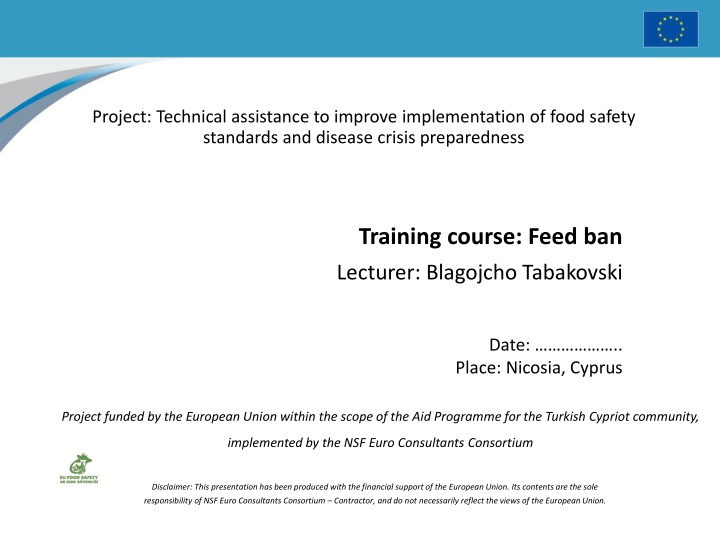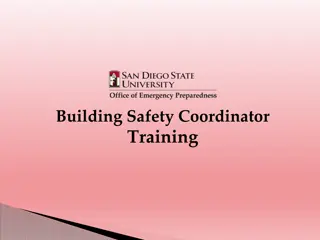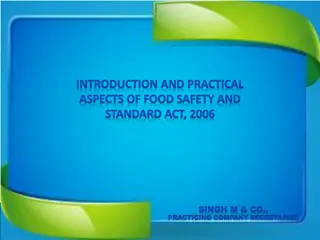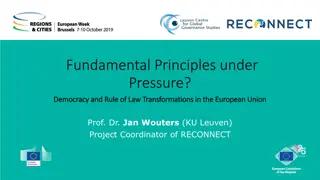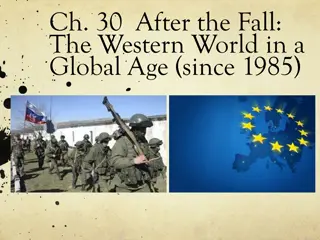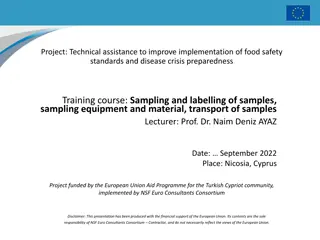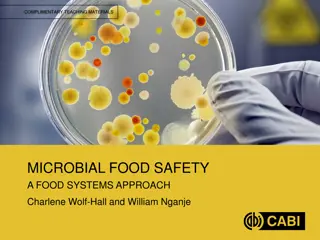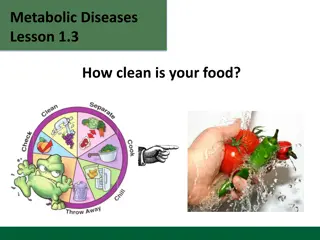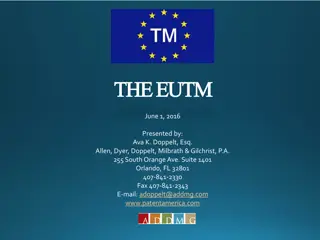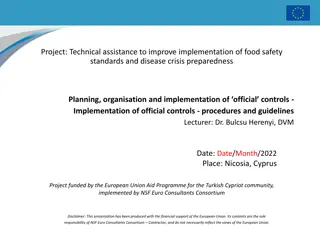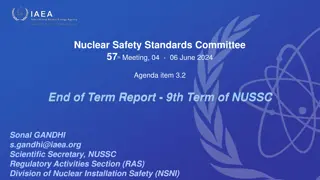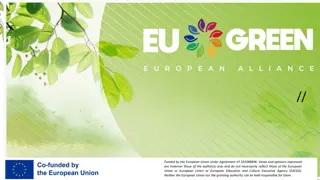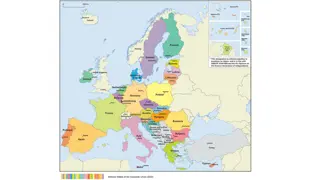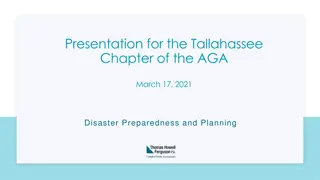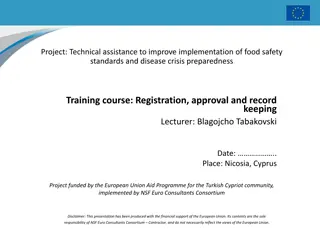Improvement of Food Safety Standards and Disease Crisis Preparedness in the European Union
This training course focuses on enhancing the implementation of food safety standards and disease crisis preparedness, with a special emphasis on feed bans and regulations laid out by the European Union. The course covers legal frameworks, prohibitions on animal feeding, extensions of these prohibitions, and derogations for specific types of animal feed. It aims to equip participants with the necessary knowledge and procedures to ensure compliance with EU regulations in the context of food safety and disease prevention.
Uploaded on Sep 21, 2024 | 1 Views
Download Presentation

Please find below an Image/Link to download the presentation.
The content on the website is provided AS IS for your information and personal use only. It may not be sold, licensed, or shared on other websites without obtaining consent from the author.If you encounter any issues during the download, it is possible that the publisher has removed the file from their server.
You are allowed to download the files provided on this website for personal or commercial use, subject to the condition that they are used lawfully. All files are the property of their respective owners.
The content on the website is provided AS IS for your information and personal use only. It may not be sold, licensed, or shared on other websites without obtaining consent from the author.
E N D
Presentation Transcript
Project: Technical assistance to improve implementation of food safety standards and disease crisis preparedness Training course: Feed ban Lecturer: Blagojcho Tabakovski Date: .. Place: Nicosia, Cyprus Project funded by the European Union within the scope of the Aid Programme for the Turkish Cypriot community, implemented by the NSF Euro Consultants Consortium Disclaimer: This presentation has been produced with the financial support of the European Union. Its contents are the sole responsibility of NSF Euro Consultants Consortium Contractor, and do not necessarily reflect the views of the European Union.
CONTENT Legal framework Feed ban Annex V Extended prohibition Derogation General and specific rules
EU - Regulation Regulation (EC) No 999/2001 of the European Parliament and of the Council of 22 May 2001 is laying down rules for the prevention, control and eradication of certain transmissible spongiform encephalopathies
Prohibition of animal feeding The feeding of ruminants with protein derived from animals shall be prohibited. Prohibition is extended to animals other than ruminants and restricted, with regard to the feeding of those animals with products of animal origin. Undetermined BSE risk are not permitted to export except for feed for dogs, cats and fur animals.
Extension of prohibition To ruminants of dicalcium phosphate and tricalcium phosphate of animal origin and compound feed containing these products to non-ruminant farmed animals, other than fur animals, of: (i) processed animal protein; (ii) blood products; (iii) hydrolysed protein of animal origin; (iv) dicalcium phosphate and tricalcium phosphate of animal origin; (v) feed containing the products listed in points (i) to (iv).
Derogation for feeding Ruminants of: (i) milk, milk-based products, milk-derived products, colostrum and colostrum products; (ii) eggs and egg products; (iii) collagen and gelatine derived from non-ruminants; (iv) hydrolysed proteins derived from: parts of non-ruminants, or ruminant hides and skins; (v) compound feed containing the products listed in points (i) to (iv) above;
Derogation for feeding Non-ruminant farmed animals of the following feed materials and compound feed: (i) hydrolysed proteins derived from parts of non-ruminants or from ruminant hides and skins (ii) fishmeal and compound feed containing fishmeal (iii) dicalcium phosphate and tricalcium phosphate of animal origin and compound feed containing such phosphates . (iv) blood products derived from non-ruminants and compound feed containing such blood products .
Derogation for feeding Aquaculture animals of the following feed materials and compound feed: (i) processed animal protein derived from non-ruminants, other than fishmeal and other than processed animal protein derived from farmed insects, and compound feed containing such processed animal protein processed animal protein derived from farmed insects, and compound feed containing such processed animal protein
Derogation for feeding Unweaned ruminants of milk replacers containing fishmeal . farmed animals of feed materials of plant origin and compound feed containing such feed materials contaminated with insignificant amount of bone spicules derived from unauthorised animal species after risk assessment that take into account at least the following: (i) the level of the contamination; (ii) the nature and the source of the contamination; (iii) the intended use of the contaminated feed;
Derogation for feeding Poultry of the following feed materials and compound feed: (i) processed animal protein derived from porcine animals and compound feed containing such processed animal protein (ii) processed animal protein derived from farmed insects, and compound feed containing such processed animal protein
Derogation for feeding Porcine animals of the following feed materials and compound feed: (i) processed animal protein derived from poultry and compound feed containing such processed animal protein (ii) processed animal protein derived from farmed insects, and compound feed containing such processed animal protein
General conditions for derogation Transport and storage of feed materials and compound feed intended to be used for feeding non-ruminant farmed animals. Production of compound feed intended to be used for feeding non-ruminant farmed animals. Import of feed materials and compound feed intended to be used for feeding non-ruminant farmed animals other than fur animals. Use and storage on farms of feed intended to be used for feeding non-ruminant farmed animals.
Specific conditions for derogation Fishmill and compound feed containing fishmeal Dicalcium phosphate and tricalcium phosphate Blood products Processed animal protein derived from non-ruminants, other than fishmeal and other than processed animal protein derived from farmed insects Milk replacers containing fishmeal for the feeding of unweaned ruminants Processed animal protein derived from farmed insects Processed animal protein derived from porcine animals (poultry) Processed animal protein derived from poultry (pigs)
General requirement Listing slaughterhouses, cutting plants and other food establishments, processing plants, authorised compound feed establishments and storage plants Transport and storage of feed materials and compound feed containing products derived from ruminants Production of compound feed intended for fur animals or for pet animals containing products derived from ruminants or from non-ruminants Use and storage on farms of feed materials and compound feed for farmed animals containing products derived from ruminants Export of processed animal protein and products containing such protein
official control Official controls shall include inspections and sampling for analysis on processed animal protein and feed in compliance with the methods of analysis for the determination of constituents of animal origin for the control of feed set out in Annex VI to Regulation (EC) No 152/2009. The competent body shall verify on a regular basis the competence of laboratories carrying out analyses for such official controls, in particular by evaluating the results of inter-proficiency tests. If the competence is considered unsatisfactory, a retraining of the laboratory staff shall be undertaken by the laboratory as the minimal corrective measure, prior to carrying out further analyses.
Accompanying document The commercial document or, as appropriate, the health certificate (Reg. 2009 /1069 Art. 21(2)) and the label shall be clearly marked with the following words: For processed animal protein derived from farmed insects, porcine animals or poultry Processed animal protein derived from [please insert relevant farmed animals from which the processed animal protein is derived listed in the first column of Table 1] shall not be used in feed for farmed animals except [please insert corresponding farmed animals to which the processed animal protein may be fed listed in the second column of Table 1] For the label of compound feed containing . contains processed animal protein derived from [please insert relevant farmed animals from which the processed animal protein is derived listed in the first column of Table 1] shall not be fed to farmed animals except [please insert corresponding farmed animals to which the processed animal protein may be fed listed in the second column of Table 1]
Table 1 Farmed animals from which the processed animal protein is derived Farmed animals to which the processed animal protein may be fed Farmed insects Aquaculture animals, fur animals, porcine animals, poultry Porcine animals Aquaculture animals, fur animals, porcine animals, poultry Poultry Aquaculture animals, fur animals, porcine animals Farmed insects and porcine animals Aquaculture animals, fur animals, poultry Farmed insects and poultry Aquaculture animals, fur animals, porcine animals Porcine animals and poultry Aquaculture animals, fur animals Farmed insects, porcine animals and poultry Aquaculture animals, fur animals
CONTACT Project e-mail: foodsafetyprojectTCc@gmail.com THANK YOU FOR YOUR ATTENTION Project funded by the European Union within the scope of the Aid Programme for the Turkish Cypriot community, implemented by the NSF Euro Consultants Consortium
